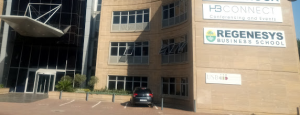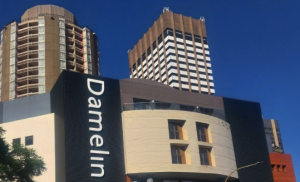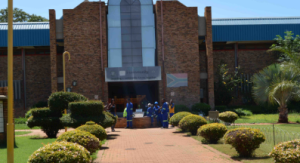The Essentials
Type of Institution: University
Fees per year: R10 000 – R75 000
Address: 205 Nelson Mandela Dr, Park West, Bloemfontein, 9301, South Africa
Phone Number: +27 51 401 9111
Chancellor: Prof Bonang Francis Mohale
Vice Chancellor: Francis Petersen
Number of students: 40 000+
Website: https://www.ufs.ac.za/
Email: info@ufs.ac.za
Table Of Contents
- Overview
- Contact Details
- Address
- Location
- School Fees
- Courses & Programs
- Vacancies and Entry Requirements
- Logo
- Notable Alumni
- Pros and Cons
- Author’s Review
Overview
The University of the Free State (UFS) is one of South Africa’s oldest and most respected institutions of higher learning. Founded in 1904 as Grey College, UFS has grown into a dynamic university that offers high-quality education, research, and community engagement.
Located primarily in Bloemfontein, the capital of the Free State Province, UFS is a public, multi-campus institution known for its academic excellence, cultural diversity, and social impact.
Vision and Mission
UFS aims to be a university recognized for academic excellence, quality research, and social impact. Its mission is to equip students with the knowledge and skills to contribute to the advancement of South Africa and the world while promoting critical thinking, social justice, and ethical leadership.
Student Life
UFS provides a vibrant student experience, balancing academics with extracurricular activities. Key aspects of student life include:
Sports: UFS has excellent sports facilities and a wide range of sports teams, including rugby, cricket, soccer, netball, and athletics. The university’s rugby team, the Shimlas, is particularly well known in South Africa’s university rugby scene.
Cultural and Social Activities: The university encourages participation in various cultural, artistic, and social clubs, helping students to develop leadership and interpersonal skills. Events such as concerts, debates, and community outreach projects are frequently organized.
Student Accommodation: On-campus residences are available for students, offering convenient and affordable living. UFS also has programs to assist students in finding off-campus housing.
Student Support: UFS offers a range of support services, including academic advising, career counseling, mental health services, and financial aid assistance.
Campuses
Bloemfontein Campus: The flagship campus, located in Bloemfontein, is home to most of the university’s faculties and administrative offices. It is known for its modern facilities, vibrant student life, and strong focus on research and innovation.
Qwaqwa Campus: Located in the Eastern Free State, this campus serves predominantly rural communities, offering undergraduate and some postgraduate programs in Education, Humanities, and Natural and Agricultural Sciences.
South Campus: South Campus is dedicated to open and distance learning, providing access to higher education for students who may not be able to attend traditional on-campus classes. It offers bridging programs, diplomas, and access to online courses.
Social cohesion and reconciliation
UFS also fosters collaborations with international universities and organizations, allowing its researchers to participate in global research initiatives.
Community Engagement and Social Responsibility
UFS plays a pivotal role in promoting social change and transformation within South Africa. The university’s Institute for Reconciliation and Social Justice is dedicated to advancing social justice, human rights, and community development. UFS also engages in various outreach programs, addressing issues such as poverty, education, and public health in local communities.
Language Policy
UFS promotes multilingualism and uses English as the primary language of instruction. However, the university supports and accommodates students who speak Afrikaans and Sesotho, reflecting the linguistic diversity of the region.
Transformation and Inclusivity
The University of the Free State is strongly committed to transformation and inclusivity. It strives to create an environment where students from diverse racial, cultural, and socioeconomic backgrounds can thrive. The university actively promotes diversity, with programs aimed at fostering tolerance, social cohesion, and equality.
University of the Free State Contact Details
You can contact University of the Free State via their landline, email or you can visit their website for further contact details.
Phone Number: +27 51 401 9111
Website: https://www.ufs.ac.za/
Email: info@ufs.ac.za
University of the Free State Address
205 Nelson Mandela Dr, Park West, Bloemfontein, 9301, South Africa
University of the Free State Location
University of the Free State has 3 campuses situated around the province then the main campus (Bloemfontein) is located in the suburb of Park West on Nelson Mandela Dr in the city of Bloemfontein under the Free state of South Africa.
University of the Free State Fees
University of the Free State’s fees is currently standing at R10 000 – R75 000 per year depending on the program you are studying and the level of degree you are studying. Please contact the institution or visit them to get the latest fees structure as it can change at any year or semester.
University of the Free State Courses & Programs
The University of the Free State (UFS) offers a wide range of undergraduate and postgraduate programs across its faculties.
Faculty of Economic and Management Sciences
Undergraduate Programs:
BCom in Accounting
BCom in Economics
BCom in Business Management
BCom in Finance
BCom in Human Resource Management
BCom in Marketing Management
BAdmin (Public Administration)
Postgraduate Programs:
Honours in Accounting, Economics, Business Management, and Human Resource Management
Master of Business Administration (MBA)
MCom in Accounting, Economics, and Business Management
MAdmin in Public Administration
PhD in Economic and Management Sciences
Faculty of Humanities
Undergraduate Programs:
BA in Psychology
BA in Sociology
BA in Political Science
BA in Communication Science
BA in English, Afrikaans, Sesotho, or other language studies
BA in History
BA in Journalism
Postgraduate Programs:
Honours in Psychology, Sociology, Political Science, and Communication Science
Master’s in Psychology (Counseling and Clinical Psychology)
Master’s in History, Language Studies, and Political Science
PhD in Humanities (various fields)
Faculty of Health Sciences
Undergraduate Programs:
MBChB (Bachelor of Medicine and Bachelor of Surgery)
Bachelor of Nursing
Bachelor of Optometry
Bachelor of Occupational Therapy
Bachelor of Physiotherapy
BSc in Dietetics
Postgraduate Programs:
Honours in Nursing, Physiotherapy, and Dietetics
Master’s in Medicine (MMed) (various specializations)
Master’s in Public Health (MPH)
PhD in Health Sciences
Faculty of Law
Undergraduate Programs:
LLB (Bachelor of Laws)
BCom Law
BA Law
Postgraduate Programs:
Postgraduate Diploma in Financial Planning Law
LLM in Constitutional Law, Human Rights, and Environmental Law
Master’s in Labour Law
PhD in Law
Faculty of Natural and Agricultural Sciences
Undergraduate Programs:
BSc in Agricultural Sciences (Plant and Soil Sciences, Animal Sciences)
BSc in Environmental Science
BSc in Biochemistry
BSc in Chemistry
BSc in Computer Science
BSc in Mathematics and Applied Mathematics
BSc in Physics
BSc in Genetics and Biotechnology
Postgraduate Programs:
Honours in Agriculture, Biochemistry, Chemistry, Computer Science, and Environmental Science
Master’s in Agricultural Sciences, Environmental Science, and Physics
MSc in Mathematics, Computer Science, and Genetics
PhD in Natural and Agricultural Sciences (various fields)
Faculty of Education
Undergraduate Programs:
BEd in Foundation Phase Teaching
BEd in Intermediate Phase Teaching
BEd in Senior and FET Phase Teaching (specializations in Mathematics, Science, Languages, etc.)
Postgraduate Programs:
Postgraduate Certificate in Education (PGCE)
Honours in Education
Master’s in Education (Curriculum Studies, Educational Leadership, and more)
PhD in Education
Faculty of Theology and Religion
Undergraduate Programs:
Bachelor of Divinity
Bachelor of Theology
BA in Theology and Religion Studies
Postgraduate Programs:
Honours in Theology
Master’s in Theology (various specializations such as Biblical Studies, Systematic Theology, and Practical Theology)
PhD in Theology and Religion
Faculty of Business School (Postgraduate)
Master of Business Administration (MBA)
Postgraduate Diploma in Business Administration
PhD in Business Administration
Faculty of Arts and Social Sciences
Undergraduate Programs:
BA in Fine Arts
BA in Music
BA in Drama and Theatre Arts
BA in Philosophy
BA in Social Work
Postgraduate Programs:
Honours in Music, Fine Arts, Drama, and Theatre Arts
Master’s in Fine Arts, Music, Drama, and Social Work
PhD in Social Sciences
Distance Learning Programs (South Campus)
Bachelor of Management Leadership (BML)
Diplomas in Open and Distance Learning
Bridging Courses and Access Programs for students who do not meet the minimum entry requirements for full-time studies.
University of the Free State Vacancies and Entry Requirements
Entry Requirements
UFS offers a variety of undergraduate and postgraduate programs, each with specific entry requirements.
Undergraduate Entry Requirements
General Requirements:
National Senior Certificate (NSC): A student must have a Bachelor’s pass or equivalent.
Admission Points Score (APS): Most programs require a minimum APS score of 28 to 36. The APS is calculated based on your final high school marks.
Language Requirements: A minimum achievement level of 4 (50%) in English is required.
Faculty-Specific Requirements: Some faculties require specific subject combinations and minimum marks in subjects such as Mathematics, Physical Sciences, and Life Sciences.
Faculty-Specific Requirements:
Faculty of Economic and Management Sciences:
APS: A minimum of 28–32 depending on the program.
Mathematics: Required for programs like BCom Accounting or BCom Economics, with a minimum of level 4 (50%).
Faculty of Health Sciences:
APS: 35 or higher for MBChB (Medicine) and 30 for other health sciences programs.
Subjects: High achievement in Life Sciences and Physical Sciences (typically level 5 or 6).
Faculty of Natural and Agricultural Sciences:
APS: 28–32 depending on the program.
Mathematics and Science: Required for most BSc programs with a minimum of level 4 or 5 in Mathematics and Physical Sciences.
Faculty of Law:
APS: A minimum of 32 for LLB.
Subjects: Good performance in subjects like History or Social Sciences can be beneficial but not required.
Distance Learning (South Campus):
More flexible entry requirements may apply for students enrolled in distance learning programs. These may include bridging courses or alternative pathways for students who do not meet the minimum requirements for full-time programs.
Postgraduate Entry Requirements
Honours Programs:
Bachelor’s Degree: A completed relevant undergraduate degree is required, with a minimum average of 60%–65% in the major subject area.
Additional Requirements: Some programs require an interview, portfolio submission (for arts-related programs), or specific work experience.
Master’s Programs:
Honours Degree or Equivalent: A relevant honours degree with a minimum of 65% is typically required.
Research Proposal: For research-based master’s programs, students need to submit a detailed research proposal.
Work Experience: Some professional master’s programs, such as an MBA, may require relevant work experience.
Doctoral (PhD) Programs:
Master’s Degree: A completed master’s degree in a relevant field is required.
Research Proposal: A detailed research proposal outlining the intended study.
Supervision: Applicants need to have a potential supervisor before enrolling, which requires identifying and approaching a faculty member whose research aligns with the applicant’s interests.
International Students:
Recognition of Qualifications: International students must ensure that their qualifications are evaluated by the South African Qualifications Authority (SAQA) to meet the equivalent of a South African NSC or higher.
Language Proficiency: Proof of English language proficiency (such as TOEFL or IELTS) is required if the student’s previous education was not in English.
Visa and Study Permit: International students must have a valid study permit before they can register at UFS.
Application Process for Students:
Online Application: UFS has an online application portal where prospective students can apply for their chosen programs.
Submit required documents: ID/passport copy, academic transcripts, proof of payment for the application fee, and other requested information.
Application Deadlines:
Undergraduate applications typically close in September for the following academic year.
Postgraduate application deadlines vary depending on the program and research timelines.
University of the Free State Logo
Below is the logo of University of the Free State with excellent quality and it is available to download in PNG (transparent file) JPEG and PDF.
University of the Free State Logo
University of the Free State Notable Alumni
Bohang Moeko – South African actor
Wian du Preez – South African rugby union player
Ox Nché – South African rugby union player
Cheslin Kolbe – South African rugby union player
Steve Komphela – South African football coach
Rolene Strauss – South African model
Lehlohonolo Majoro – South African footballer
Tarina Patel – South African actress and film producer
Colin Ingram – South African cricketer
Bismarck du Plessis – South African former rugby union player
University of the Free State Pros and Cons
Pros
Diverse Academic Programs: UFS offers a broad range of undergraduate and postgraduate programs across various faculties, including Humanities, Business, Education, Health Sciences, Law, Natural Sciences, and Theology. This diversity allows students to choose from a wide array of disciplines and specializations.
Strong Research Focus: The university is known for its strong emphasis on research and innovation. It has several research institutes and centers focusing on areas such as health, agriculture, and social sciences, which contribute to significant research output and impact.
Inclusive and Transformative Education: UFS is committed to transformation and inclusivity, reflecting broader national goals of equity and access in higher education. The university’s initiatives promote a diverse and equitable learning environment for students from various backgrounds.
Beautiful Campuses: The main campuses in Bloemfontein, Qwaqwa, and South Campus are known for their attractive and well-maintained facilities. The Bloemfontein campus, in particular, is noted for its picturesque surroundings and state-of-the-art infrastructure.
Comprehensive Student Support Services: UFS provides extensive support services including academic advising, career counseling, mental health services, and student wellness programs. These services are designed to help students succeed academically and personally.
Strong Community Engagement: The university has a strong commitment to community service and engagement. Students and staff are involved in various outreach programs and projects that address local and regional needs.
Affordable Education: Compared to some other South African universities, UFS offers relatively affordable tuition fees. The university also provides various financial aid options and scholarships to support students.
Interdisciplinary Opportunities: UFS encourages interdisciplinary study, allowing students to combine courses from different faculties and gain a broader perspective in their field of interest.
Cons
Location and Regional Limitations: The main campuses are located in Bloemfontein and Qwaqwa, which may not offer the same level of urban amenities or career opportunities as universities located in major cities like Johannesburg or Cape Town.
Administrative Challenges: Some students have reported issues with administrative processes such as registration delays, financial aid processing, and communication inefficiencies. These challenges can affect the overall student experience.
Funding and Resource Constraints: Like many public universities, UFS may face challenges related to funding and resource allocation, which could impact the availability of research grants, facilities, and certain student services.
Infrastructure Limitations: Although the campuses are well-maintained, some students may find that certain facilities or technological resources are not as advanced or plentiful as those at larger, more well-funded institutions.
Cultural and Linguistic Diversity: While UFS promotes inclusivity, the university’s location in a predominantly Afrikaans-speaking region may present linguistic and cultural challenges for some students, especially those who are non-Afrikaans speakers.
Housing Availability: On-campus accommodation can be limited, and many students may need to find off-campus housing. This can be a challenge, particularly for first-year students or those from outside the region.
Variability in Program Quality: As with many institutions, the quality of programs and courses can vary between faculties and departments. Some programs may not offer the same level of specialization or industry connections as others.
Alumni Network: UFS’s alumni network, while growing, may not yet have the same level of global reach or influence as those of more established universities. This can impact networking and career opportunities for graduates.
Author's Review
The University of the Free State (UFS) offers a distinctive and enriching educational experience, characterized by its commitment to inclusivity, research excellence, and community engagement.
With its campuses in Bloemfontein and Qwaqwa, UFS provides a range of diverse academic programs across multiple disciplines, supported by beautiful facilities and a vibrant campus life. The university’s dedication to transformation and its comprehensive student support services contribute to a nurturing and dynamic learning environment.
UFS stands out for its strong emphasis on research and its growing international presence, which enhances its academic offerings and global connections. The university’s affordability and diverse range of extracurricular activities further enhance its appeal, making it a viable option for many students seeking a comprehensive and supportive higher education experience.
However, prospective students should consider some of the challenges, such as the regional location of its campuses, which may offer fewer urban amenities and career opportunities compared to universities in major cities. Additionally, administrative inefficiencies and potential limitations in specialized programs could impact the overall experience.
In summary, the University of the Free State represents a robust choice for students looking for a university that prioritizes academic excellence, social responsibility, and personal development.
Its strengths in research, community involvement, and student support make it a commendable institution for those seeking a transformative educational journey in a supportive and inclusive environment.



